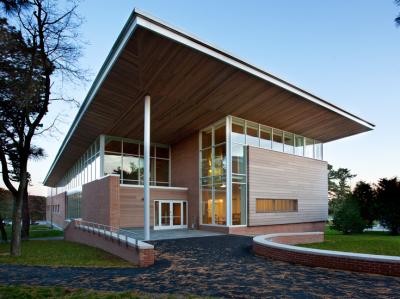Enviro Advocacy Group Sets Up Shop at College

The Peconic Institute, a not-for-profit dedicated to environmental sustainability and resiliency, will hold a launch conference on April 19 at 10 a.m. at the Avram Theater on the Stony Brook Southampton campus. The conference is free and open to the public, and a fund-raiser will follow at Southampton Publick House.
A key component of the institute’s mission is its climate resilience and recovery program, which would “advance systems and knowledge on the science and engineering of resilience and sustainability for preparedness, response, and recovery from extreme climate,” according to its Web site, as well as integration of this knowledge into education, training, and application.
“There needs to be a communal interest housed at that campus to serve as a connector to the community,” said John Botos, the executive director of the institute, which will be housed in the on-campus library. The organization is in the formative stage of defining itself, he said, but resilience and sustainability — or “retrosilience” — will be a key theme. It will offer fellowship opportunities for college and high school students, details of which will be unveiled at the launch conference.
“We are looking to be a one-stop for environmental needs, providing access to information 24 hours a day, 7 days a week,” said Mr. Botos. “We’re trying to reinvigorate the campus, serving as a hub of knowledge to local businesses and individuals, and taking it one step further to municipalities.”
There are opportunities for cleaner, greener communities, he said. “They’re looking for new innovative ideas of how to reduce greenhouse gas emissions.”
The climate resilience and recovery program, said Frank Dalene of the institute, resulted from the establishment of the Hamptons Green Alliance, an association of South Fork building and related-service professionals that collectively promote green building practices. That group took on a project, the reconstruction of a fire-damaged house in Water Mill, that aimed to achieve three goals: net-zero energy consumption, carbon neutrality, and LEED Platinum certification.
That project, Mr. Dalene said, provided abundant research and development opportunities, and he was invited to submit a paper to the American Institute of Physics Journal of Renewable and Sustainable Energy detailing his findings. His paper, “Technology and Information Management for Low-Carbon Building,” was peer-reviewed and published last year.
Mr. Dalene’s work and that of the Hamptons Green Alliance has been merged with the Peconic Institute. “The idea is to leverage what we did with the Hamptons Green Alliance, the lessons learned, how we were able to measure and analyze what we did, and raise the bar for our next project,” he said. “We want to provide the ‘how’ in resiliency, how a resilient building is built. We want to look at everything from infrastructure to natural systems. The two are interconnected.”
The new institute will also collaborate with Brookhaven National Laboratory, he said, to refine the definition of resiliency. “Right now, we’re defining it as a building that’s LEED Platinum Plus, the ‘plus’ being resilience, something that goes beyond sustainability,” Mr. Dalene said.
Despite the still fresh and visible effects of Superstorm Sandy, the idea that climate change is a real, man-made phenomenon remains controversial in this country. “When I speak in other countries, they accept the fact that climate change is man-made,” said Mr. Dalene. “Here, there is this problem, but we’re saying right now, and want to say in the Peconic Institute, that it doesn’t matter what the cause is. What’s indisputable is that ocean temperatures are increasing . . . there will be sea level rise. With our coastlines on the East End, we’re ground zero, the epicenter.”
Consequently, he said, proactive planning for resilience and recovery is essential, given predictions of more frequent, and more violent, extreme weather events. “In preparedness, you cut the time of recovery, the cost, the cost of human life. These go hand in hand. When buildings are destroyed, we want to build them better so they can withstand the next storm.” To that end, the program will develop and test materials and practices that will make buildings stronger and more resilient.
The Peconic Institute also intends to serve as a conduit between regions as close as the North and South Forks and as distant as the Eastern and Western Hemispheres. “In other parts of the world, they’re dealing with similar issues,” Mr. Dalene said. “If we can all work together, we can find solutions and solve these problems. It’s about being proactive.”
Mr. Botos said he was sure that the institute will succeed, and has identified numerous funding opportunities. The launch conference, he said, is about “letting the public know who we are and what we do. We’re confident the public will see the value of the institute. We will be successful.”
